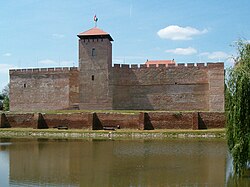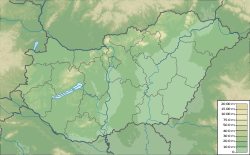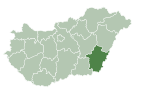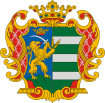Gyula, Hungary
Gyula
| |
|---|---|
 Gyula Castle | |
| Coordinates: 46°39′N 21°17′E / 46.650°N 21.283°E | |
| Country | |
| County | Békés |
| District | Gyula |
| Area | |
| • Total | 255.8 km2 (98.8 sq mi) |
| Population (2017) | |
| • Total | 30,004[1] |
| Demonym | gyulai |
| Population by ethnicity | |
| • Hungarians | 83.4% |
| • Romanians | 3.1% |
| • Germans | 3.1% |
| • Gypsies | 0.3% |
| • Slovaks | 0.3% |
| • Others | 0.8% |
| Population by religion | |
| • Roman Catholic | 18.4% |
| • Greek Catholic | 0.4% |
| • Calvinists | 17.9% |
| • Lutherans | 1.6% |
| • Other | 4.5% |
| • Non-religious | 28.2% |
| • Unknown | 29.0% |
| Time zone | UTC+1 (CET) |
| • Summer (DST) | UTC+2 (CEST) |
| Postal code | 5700, 5711 |
| Area code | (+36) 66 |
| Website | gyula |





Gyula (Hungarian pronunciation: [ˈɟulɒ] , Template:Lang-de, Template:Lang-ro, Template:Lang-tr) is a town in Békés County, Hungary. The town is best known for its Medieval castle and a thermal bath. Ferenc Erkel, the composer of the Hungarian national anthem, and Albrecht Dürer the Elder, the father of Albrecht Dürer, also were born in Gyula.[4]
Geography
Gyula is located in the Great Hungarian Plain up on the River Fehér-Körös, 235 km (146 mi) southeast from Budapest and 5 km (3 mi) from the border with Romania. Békéscsaba-Gyula-Kötegyán railway line and Highway 44 also cross the town. Highway 44 is a four-lane expressway between Gyula and the county seat Békéscsaba.[5]
Name
Gyula is named after the Medieval Hungarian ruler Gyula III.[4] Gyula was also a title among the Hungarian tribes and still a popular given name for boys.
History
The first recorded reference to Gyula was in a document dated 1313 which mentions a monastery called Gyulamonostora (Julamonustra in Latin). By 1332 the settlement around the monastery was being called Gyula / Jula. The construction of Gyula Castle began in the 14th century but finished only in the mid-16th century.[4] It was the property of the Maróthy family and later John Corvinus, the illegitimate son of Matthias Corvinus.[4] Turks conquered Gyula in 1566 and the town remained part of the Ottoman Empire until liberated by Christian troops in 1694.[4] Due to the wars, most of the native Hungarian population fled from Gyula, Békés County became near uninhabited.[6] The landowner János Harruckern invited German, Hungarian, and Romanian settlers, who re-established the town in the early 18th century.[4] Gyula became a popular tourist destination in the 20th century, the thermal bath was established in 1942 and expanded in 1959. The castle was restored in 1962.[4]
Demographics
According to the 2011 census the total population of Gyula was 31,067, of whom there were 25,895 (83.4%) Hungarians, 974 (3.1%) Romanians, 971 (3.1%) Germans and 102 (0.3%) Romani by ethnicity. In Hungary people can declare more than one ethnicity, so some people declared Hungarian and a minority one together.[7][8] Gyula is the center of the small native Romanian community in Hungary.
In 2011 there were 5,726 (18.4%) Roman Catholic, 5,560 (17.9%) Hungarian Reformed (Calvinist), 606 (2.0%) Orthodox and 507 (1.6%) Lutheran in Gyula. 8,304 people (26.7%) were irreligious and 453 (1.5%) Atheist, while 9,012 people (29.0%) did not declare their religion.[7]
Tourist attractions
- Gyula Castle (Gyulai vár)
- Thermal bath (Gyulai gyógyfürdő)
- 100-year-old confectionery (100 éves cukrászda)
- Town hall, 1861 (Városháza)
- Birth house of Ferenc Erkel (Erkel Ferenc szülőháza)
- Saint Michael Cathedral, 1825 (Szent Miklós katedrális)
- Roman Catholic church, 1775-1777 (Római katolikus templom)
- Roman Catholic chapel, 1738-1752, (Római katolikus kápolna)[4][5]
Politics
The current mayor of Gyula is Dr. Ernő István Görgényi (Fidesz-KDNP).
The local Municipal Assembly has 14+1 members divided into this political parties and alliances:[9]
| Party | Seats | 2014 Council | |||||||||||
|---|---|---|---|---|---|---|---|---|---|---|---|---|---|
| Fidesz-KDNP | 10 | ||||||||||||
| Gyulai Városbarátok Köre | 2 | ||||||||||||
| Movement for a Better Hungary (Jobbik) | 1 | ||||||||||||
| Unity (Együtt-PM-MSZP-DK) | 1 | ||||||||||||
Notable people
Born in Gyula
- Béla Bánáthy (1919–2003), social scientist and professor
- Zoltán Bay (1900–1992), physicist (born in Gyulavári, now part of Gyula)
- Imre Bródy (1891–1944), physicist[4]
- Albrecht Dürer the Elder (1427–1502), the father of Albrecht Dürer
- Ferenc Erkel (1810–1893), composer
- Imre König (1901–1992), chess player
- László Krasznahorkai (born 1954), novelist and screenwriter
- Mihály Mező (born 1978), singer and musician
- George Pomutz (1818–1882), American diplomat and general
Lived in Gyula
- Béla Bartók (1881-1945), Hungarian composer[4]
Burials in Gyula
- John Corvin (1473-1504), King of Bosnia, illegitimate son of Matthias Corvinus
- Beatrice de Frangepan (1480-1510), wife of John Corvin[4]
Twin Towns - Sister Cities
Gyula is twinned with:
 Arad, Romania (1994)
Arad, Romania (1994) Bălţi, Moldova
Bălţi, Moldova Budrio, Italy (1965)
Budrio, Italy (1965) Ditzingen, Germany (1991)
Ditzingen, Germany (1991) Droitwich, United Kingdom (2001)
Droitwich, United Kingdom (2001) Krumpendorf, Austria (1995)
Krumpendorf, Austria (1995) Miercurea-Ciuc, Romania (1993)
Miercurea-Ciuc, Romania (1993) Schenkenfelden, Austria (1997)
Schenkenfelden, Austria (1997) Zalău, Romania (1991)
Zalău, Romania (1991)
References
- ^ Gyula, KSH
- ^ KSH - Gyula, 2011
- ^ KSH - Gyula, 2011
- ^ a b c d e f g h i j k Antal Papp: Magyarország (Hungary), Panoráma, Budapest, 1982, ISBN 963 243 241 X, p. 860, pp. 453-456
- ^ a b Magyarország autóatlasz, Dimap-Szarvas, Budapest, 2004, ISBN 963-03-7576-1
- ^ Károly Kocsis (DSc, University of Miskolc) – Zsolt Bottlik (PhD, Budapest University) – Patrik Tátrai: Etnikai térfolyamatok a Kárpát-medence határon túli régióiban, Magyar Tudományos Akadémia (Hungarian Academy of Sciences) – Földrajtudományi Kutatóintézet (Academy of Geographical Studies); Budapest; 2006.; ISBN 963-9545-10-4, CD Atlas
- ^ a b 2011 Hungarian census, Békés county
- ^ Hungarian census 2011 - final data and methodology
- ^ [1]
External links
- Official website in Hungarian





